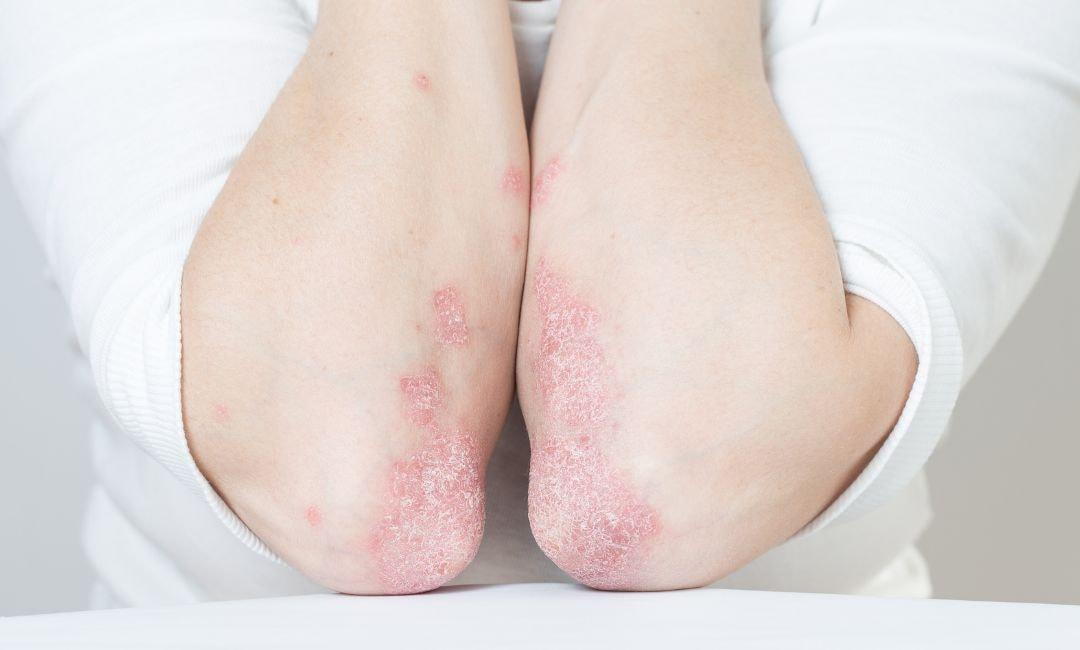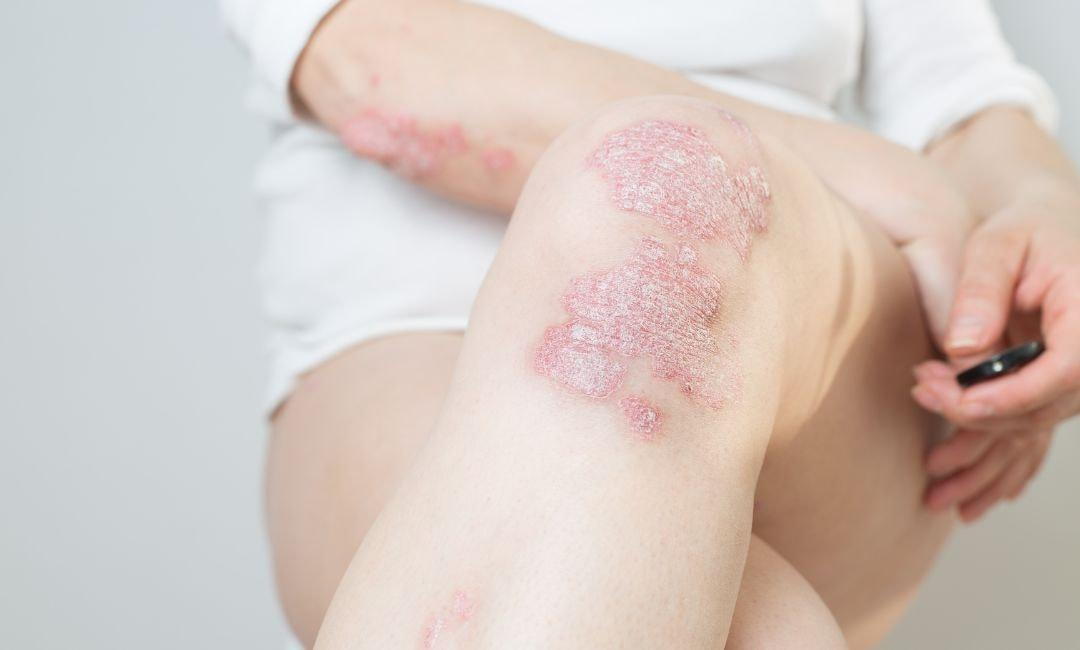Is Psoriasis a Microbial Infection?

- posted: Sep. 12, 2024
Psoriasis is a frustrating skin condition that causes red, itchy patches. But what causes it? Is it a simple skin irritation, or is there something more going on beneath the surface? We're talking about the possibility of a microbial infection.
In this article, we're going to dive deep:
Explore the link between microbes and psoriasis
Discuss the implications for treatment
Provide practical tips for managing psoriasis
Spoiler alert: understanding the role of microbes could be a game-changer in managing psoriasis.
And hey, if you're in the Fort Lauderdale area and want a professional opinion, check out Natura Dermatology & Cosmetics. Dr. Richardson and his team specialize in treating all skin types, including those with psoriasis.
Bugs on Your Skin: The Psoriasis Connection
We've all heard about the importance of a healthy gut microbiome – that bustling community of bacteria living in our digestive system. But did you know your skin also has its own unique microbiome? And this microscopic world might play a bigger role in psoriasis than we once thought.
Imagine your skin is like a rainforest, teeming with diverse life. When everything's in balance, it's a beautiful ecosystem. But throw things out of whack, and you might end up with a microbial imbalance. Certain bacteria might flourish, while others dwindle. And this could trigger an inflammatory response – hello, psoriasis flare-up.
Emerging research suggests that people with psoriasis often have a different skin microbiome compared to those without the condition. We're talking about changes in the types and numbers of bacteria present. Some studies even point to specific bacteria, like Staphylococcus aureus, being more prevalent in psoriatic skin.
But hold on – correlation doesn't always equal causation.
Just because these bacteria are hanging out on psoriatic skin doesn't necessarily mean they're the cause of the condition. It's a bit of a chicken-and-egg situation. Did the psoriasis create a favorable environment for these bacteria, or did the bacteria trigger the psoriasis in the first place? Scientists are still trying to find out.
Either way, the connection between the skin microbiome and psoriasis is undeniable. This opens up exciting possibilities for new treatment approaches. Imagine targeting specific bacteria to restore balance to the skin's ecosystem. That could mean fewer flare-ups, less itching, and clearer skin.
Psoriasis: Infection or Not?
While we've discussed the intriguing link between microbes and psoriasis, it's important to clarify one thing: psoriasis itself is not an infection in the traditional sense. You can't "catch" it from someone else or spread it to others. It's an autoimmune disease, meaning your own immune system is mistakenly attacking healthy skin cells.
However, the presence of certain bacteria on the skin may play a role in triggering or exacerbating psoriasis flare-ups. Take your skin as a battlefield, and when the balance of microbes is disrupted, it can lead to an inflammatory response – the hallmark of psoriasis.
So, while psoriasis isn't an infection patients with psoriasis can pass on, understanding the role of microbes is crucial for managing the condition effectively. By supporting a healthy skin microbiome, you can potentially reduce flare-ups and achieve clearer, more comfortable skin.
Practical Tips for Nurturing Your Skin's Microbiome
While we wait for the next breakthrough in psoriasis treatment, there's plenty you can do to support a healthy skin microbiome and potentially reduce flare-ups. Here are some expert-backed tips for such inflammatory diseases:
Gentle Cleansing: Ditch harsh soaps and opt for gentle, fragrance-free cleansers. Overwashing can strip your skin of its natural oils and disrupt the microbiome.
Moisturize Regularly: Keeping your skin hydrated is essential. Look for moisturizers with ingredients like ceramides, hyaluronic acid, and niacinamide, which can help strengthen the skin barrier and support a healthy microbiome.
Avoid Triggers: Identify and avoid any triggers that worsen your psoriasis. This could include stress, certain foods, or harsh chemicals.
Probiotics: Consider incorporating probiotics into your diet or skincare routine. These beneficial bacteria can help restore balance to your microbiome. Pro tip: Look for products specifically formulated for the skin.
Stress Management: Stress can wreak havoc on your skin and trigger flare-ups. Find healthy ways to manage stress, such as exercise, meditation, or spending time in nature.
Talk to Your Dermatologist: They can provide personalized guidance and recommend treatments that may help improve your skin's microbiome and reduce psoriasis symptoms.
Incorporate these tips into your daily routine and be patient. It may take time to see results, but by nurturing your skin's microbiome, you're taking a proactive step towards clearer, healthier skin.
At Natura Dermatology & Cosmetics, we offer a range of treatments for this type of inflammatory bowel disease that can help improve your skin's health and manage psoriasis flare-ups. From gentle cleansers and moisturizers to advanced therapies, we have the tools and expertise to help you achieve your skin goals.
Don't let psoriasis hold you back. Take control of your skin health and embrace a brighter future. Contact Natura Dermatology & Cosmetics today to schedule a consultation and learn more about our personalized treatment plans.
The Future of Psoriasis Treatment

The link between microbes and psoriasis is opening doors to innovative treatment possibilities. We're on the cusp of a new era where we can potentially rebalance the skin's ecosystem, not just mask the symptoms.
Imagine a world where:
Personalized Probiotics: Tailored probiotic treatments restore your skin's unique microbiome, reducing flare-ups and promoting long-term skin health.
Targeted Therapies: We identify and eliminate the specific bacteria contributing to your psoriasis, offering a more precise and effective approach.
Microbiome-Friendly Skincare: Everyday products are formulated to nourish and protect your skin's delicate ecosystem, preventing imbalances and promoting overall well-being.
While these advancements may still be a few years away, they offer a glimmer of hope for those struggling with psoriasis. The future of treatment looks brighter than ever.
But in the meantime, remember that you're not alone. At Natura Dermatology & Cosmetics, we're committed to staying at the forefront of psoriasis research and treatment. We offer a range of cutting-edge therapies and personalized care plans to help you manage your condition and achieve clearer, healthier skin.
Frequently Asked Questions
What is Psoriasis?
Psoriasis is a chronic autoimmune disease that causes skin cells to grow too quickly. This rapid growth leads to a buildup of cells on the skin's surface, forming thick, scaly patches that can be itchy, painful, and sometimes even embarrassing. While the exact cause of psoriasis remains unknown, it's believed to involve a combination of genetic and environmental factors, including an overactive immune cells system.
Why Do I Have Psoriasis?
Psoriasis often runs in families, suggesting a genetic predisposition. However, certain triggers can also play a role in its development or flare-ups. These triggers can include stress, infections, injuries to the skin, certain medications, and even weather changes. If you're concerned about psoriasis, consulting a dermatologist is the best way to get a personalized assessment and treatment plan.
What Type of Infection is Psoriasis?
Psoriasis is not an infection in the traditional sense. It's not contagious, meaning you can't catch it from someone else or spread it to others. However, research suggests a potential link between psoriasis and imbalances in the skin's microbiome. This means certain bacteria may contribute to the inflammation and symptoms associated with psoriasis.
What Should I Stay Away From if I Have Psoriasis?
Certain triggers can worsen psoriasis symptoms for many people. These include:
Stress: Finding healthy ways to manage stress, such as exercise, meditation, or spending time in nature, can be beneficial.
Skin Injuries: Cuts, scrapes, and even bug bites can trigger psoriasis flare-ups in a phenomenon known as the Koebner phenomenon. Take care to protect your skin from injuries.
Certain Medications: Some medications, like beta-blockers and lithium, can worsen psoriasis. Talk to your doctor if you're concerned about any medications you're taking.
Smoking and Alcohol: These habits can negatively impact your overall health and may exacerbate psoriasis symptoms.
Harsh Soaps and Fragrances: Opt for gentle, fragrance-free cleansers and moisturizers to avoid irritating your skin.
What Happens if Psoriasis is Left Untreated?
While psoriasis isn't life-threatening, it can significantly impact your quality of life. Untreated psoriasis can lead to:
Physical Discomfort: Itching, pain, and cracking skin can make everyday activities difficult.
Emotional Distress: The visible nature of psoriasis can lead to self-consciousness, anxiety, and depression.
Joint Problems: In some cases, psoriasis can develop into psoriatic arthritis, causing joint pain and stiffness.
Other Health Issues: Research suggests a potential link between psoriasis and an increased risk of heart disease, diabetes, and other chronic conditions.
Seeking professional help for psoriasis is crucial for managing symptoms, preventing complications, and improving your overall well-being.
Ready for Clearer Skin?
Psoriasis, while not technically a microbial infection, is deeply intertwined with the world of microbes. This chronic inflammatory skin disease, affecting millions of psoriasis patients worldwide, appears to be influenced by imbalances in both the skin and gut microbiome.
Studies suggest that alterations in these microbial communities can trigger immune responses, contributing to the development and severity of psoriasis and even related conditions like psoriatic arthritis.
The gut microbiota, in particular, seems to play a pivotal role, with research indicating potential links between gut health and inflammatory skin diseases. It's a complex interplay of factors, including genetics, environmental triggers, the immune system, and the microbiome, all contributing to the psoriasis puzzle.
Key takeaways
Your skin has its own unique microbiome
Imbalances in this microbiome may contribute to psoriasis
Research is paving the way for new, microbiome-focused treatments
You can take steps today to support a healthy skin microbiome
Need a helping hand for clearer skin?
At Natura Dermatology & Cosmetics, we specialize in treating all skin types, including those with psoriasis. Dr. Richardson and his team stay on top of the latest research, offering personalized care and innovative treatments. Don't let psoriasis hold you back – reach out and schedule a consultation today.
Contact Us
Our Locations
Broward Location
800 E Broward Blvd, Ste 507
Fort Lauderdale, FL, USA
Hours of Operation
8:30 am - 12:00 pm
1:30 pm - 5:00 pm
8:30 am - 12:00 pm
1:30 pm - 5:00 pm
8:30 am - 12:00 pm
1:30 pm - 5:00 pm
8:30 am - 12:00 pm
1:30 pm - 5:00 pm
8:30 am - 12:00 pm
1:30 pm - 5:00 pm
Closed
Closed


